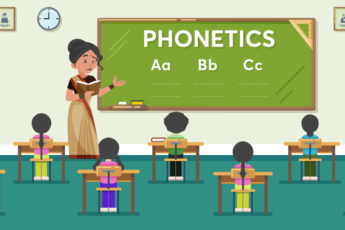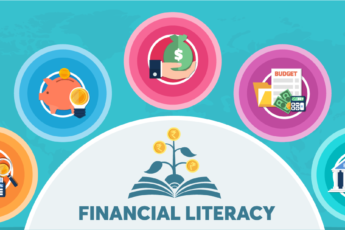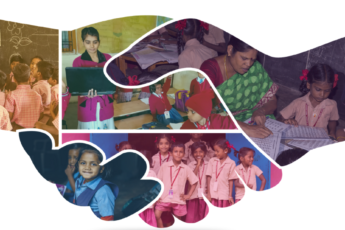The Economic Impact Of Early Education

There is a very strong correlation between early learning and a positive long-term impact on the GDP. Multiple studies have shown us that early childhood is the most fertile, most crucial period, with 85% of the total brain development happening before the age of eight. Building these foundational skills in young learners contributes to future success, both their own and their nations’ too.
Many economists believe that an investment in early childhood education yields economic growth. India stands firm in its belief that a robust ECCE system strengthens our population; the Indian government allocated 4.6% of the GDP to the education sector in 2019-2020, with the National Education Policy (NEP) 2020 even pledging to raise this to 6%.
“The demographic trend shows that India will soon have a large ageing population which is supported by a gradually shrinking workforce. So, it is imperative to have this workforce firing on all 4 cylinders with high productivity. That’s the only way we can keep our economic growth rate going.” says Nisha Holla (Co-Editor & Author, Observer Research Foundation), during a panel discussion on ‘Decoding the economics of early childhood learning and its impact on India’s GDP’, conducted by Square Panda, in partnership with the Times Network, for a special #EarlyLearningMatters series.
*Watch the whole discussion here and follow our social media pages (Facebook, LinkedIn), for more information about this series.
HOW EDUCATION RAISES ECONOMIC GROWTH
The skills developed in early childhood will create a base for the enhancement of greater cognitive development, socio-emotional skills, reasoning, and more. This new and improved workforce will then find it easier to use new technologies and software, think creatively, adjust to the changing employment landscape, and generally be more accomplished as workers. Firms with better workers will, in turn, perform better. These firms go ahead and contribute to the economy as a spillover effect. Ultimately, the GDP of our nation will reap the benefits of a good early education system. This new educated workforce can then compete with their global counterparts, getting more mobile and adaptive. Beyond that, a more educated workforce results in a healthier environment with less crime and better functioning civil institutions.
FURTHER CASE FOR INVESTING IN ECCE
- Research Supports The Positive Connection Between Early Education And The Economy: Studies conducted by bodies such as UNESCO clearly show that investment in early years had the highest returns of any education and training program, recovering at least ten times the initial cost.
- Narrows Socio-economic Disparity: When high-quality education programs are made accessible to all children across India, each community fares better with marginalised communities seeing the highest returns.
- Benefits Outweigh Costs: The short-term costs of investing in early childhood education is offset by the immediate and long-term benefits that an educated workforce bring. Additionally, there is less need for remediation and special education, better health outcomes, lower criminal justice costs, and increased productivity, all of which contribute to the development of the nation.
- Multigenerational Effects: These educated and empowered citizens will not only reap the benefits of the strong ECCE foundation in their own lives, but will pass on their learning to future generations as well, multiplying the dividends from the initial investments.
THE WAY FORWARD
- Increasing Public-Private Partnerships: While the government has already been conducting exemplary projects to enhance early learning in India, like their ICDS schemes, there are multiple areas when a public-private partnership can add value:
- many private partners invest heavily in R&D for their own services and programs, giving these offerings a strong base of research.
- a partnership can allow the government to focus on the macro levels, while their private partners can impact each micro field and sub-specialisation.
- private companies are usually external companies that have been hired to achieve a specific goal; they can be audited and course corrections can be made as required.
- Increase Quality Along With Investment: An education is only as good as the educator. For better student outcomes and a strong foundational base, educators need to be trained in the pedagogy and the neuroscience behind early learning, along with 21st century skills. This improves classroom management and delivery of curriculum, which subsequently enhances learning outcomes.
- Effective Data On Performance & Assessment: For a clearer picture of how high-calibre ECCE projects and programs affect student outcomes, and to gauge their efficacy, there is a need to regularly collect and collate real-time data on overall school performance and student assessments. This will help policymakers decide their way forward, while clearly demonstrating the positive effects of investment in early learning.

Investing in early childhood programs serves to promote inclusivity in learning, to bridge the gap between disadvantaged children and their more advantaged peers. The country’s GDP, and health and welfare, reap the benefits of a solid early learning system, with its empowered and literate citizens.
We at Square Panda are committed to building a more literate India, with a large productive workforce capable of soaring to greater heights. To further this aim, we developed holistic programs based on NEP 2020 guidelines that impact the entire ECCE ecosystem in India-the anganwadi workers, the ECCE educators, and the children themselves. To learn more about these programs, visit ecce.squarepanda.in.




Leave a Comment